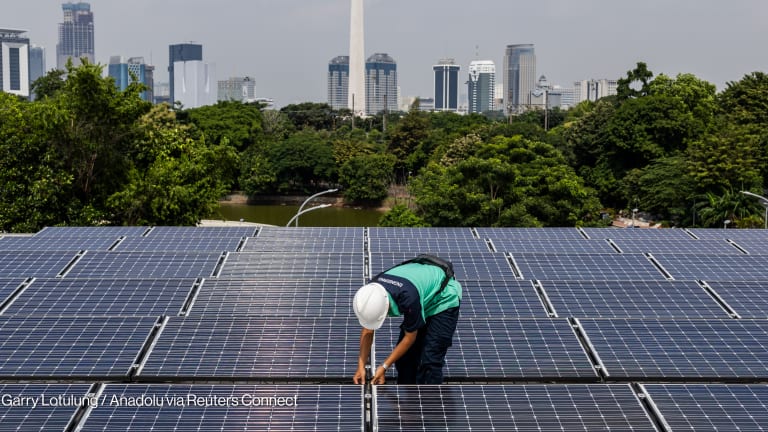
PARIS — The World Bank will no longer finance upstream oil and gas after 2019, it announced Tuesday, winning praise from civil society for its “true climate leadership.” The announcement was met with whoops and sustained applause at the One Planet climate summit in Paris, hosted by the French government, alongside the World Bank and United Nations.
World Bank President Jim Yong Kim said the decision came as the lender aligned its goals to meet those of the COP21 Paris Climate Agreement, which aims to keep global temperatures below a 2 degree increase on pre-industrial levels. The move all but eliminates the World Bank’s support for fossil fuels, with Kim saying it had not supported coal projects since 2010.
However, he added that “just as in our coal policy ... we still leave the possibility that in exceptional circumstances, the poorest countries may need some help. But the policy will change, and change dramatically.” A statement released by the bank explained that “consideration will be given to financing upstream gas in the poorest countries where there is a clear benefit in terms of energy access for the poor and the project fits within the countries’ Paris Agreement commitments.”
Stephen Kretzmann, executive director of clean energy advocacy organization Oil Change International, said “it is hard to overstate the significance of this historic announcement,” which campaigners had been calling for “for decades.”
Alex Doukas, a program director at OCI, said the move demonstrated “true climate leadership” and sent “a clear signal to the world that the fossil fuel era is ending.” However, “it is important to note that midstream and downstream oil and gas finance are also major contributors to climate change, and must be addressed to remain within the climate limits established by the Paris Agreement,” Doukas added.
Shelagh Whitley, head of the climate and energy program at the Overseas Development Institute, a London-based think tank, called on all multilateral and bilateral public finance institutions to follow the World Bank’s example. “The World Bank Group’s primary objectives are to end extreme poverty and support prosperity,” Whitley said. “There is now global consensus that energy access for the poor is best provided through clean energy and that shared prosperity can only be assured through ambitious action on climate change.”
The bank’s announcement runs counter to efforts by the Trump administration to overturn what some U.S. officials describe as an “anti-fossil fuel bias” within the international financial institutions. At last month’s U.N. climate talks in Bonn, Germany, the U.S. administration’s only official side event — which saw protesters walk out of the venue while singing an adapted version of “God Bless the U.S.A.” — focused on the role of fossil fuels in climate mitigation.
“We would argue that efforts to ban public financing of highly efficient coal plants, particularly in those developing countries that have identified highly efficient fossil as being part of their plan to meet their Paris commitments, we would argue that actually runs counter to what the Paris Agreement offers us when it comes to flexibility,” said George David Banks, Trump’s special assistant for international energy and environment, at the talks.
“That’s why many countries supported President Trump’s decision to change our Treasury Department guidance on financing highly efficient fossil in multilateral development banks. The United States encourages wealthy countries to work with developing economies to make sure that these new investments in coal and natural gas are the cleanest and most efficient possible. This is crucial if we’re going to have any kind of effective approach to climate mitigation,” Banks said.
The Bonn panel also featured a representative from the United States Energy Association, which has been working with a U.N. “expert group” to develop new guidance around efficient fossil fuel technology and financing.
“There’s been this anti-fossil bias. The president has announced that we’re going to use ... our voice and our vote within all the institutions and reverse it, and we just want to help get those projects moving and get them financed,” said USEA CEO Barry Worthington. “If the international financial institutions reverse their anti-fossil bias, I think you’ll see the commercial banking industry reversing its anti-fossil bias as well,” he said.
Kim’s announcement on Tuesday marks a sharp rejection of those efforts to carve out a greater role for fossil fuels within the bank’s energy portfolio — and sets up a potential faceoff between the institution and its largest shareholder.
Read more Devex coverage of climate change









